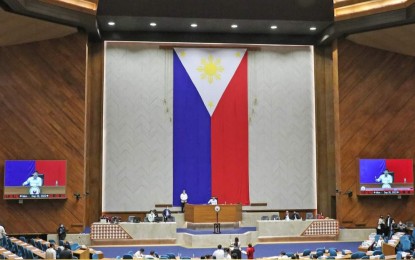
MANILA – With 274 affirmative votes, the House of Representatives on Wednesday approved on third and final reading a bill providing for the establishment of disaster food banks and stockpiles throughout the country to speed up the delivery of relief goods and other supplies during calamities.
House Bill (HB) 8463 calls for the setting up and construction of a Disaster Food Bank and Stockpile in every province and highly urbanized city in the country, providing for their maintenance and appropriating funds for their operation.
HB 8463 is a consolidation of three related measures authored by Representatives Michael Morden of API Party-list, Ivan Howard Guinto of PINUNO Party-list and Alan Ecleo of Dinagat Islands.
Under the bill, the disaster food bank and stockpile shall serve as the central repository of food, water, medicines, vaccines, antidotes, and other critical medical products, medical kits, portable power and light source, clothing, tents, and communication devices.
The shelf life of these items should be at least two years.
The establishment of the stockpile will be an inter-agency effort, to be led by the National Disaster Risk Reduction and Management Council (NDRRMC) and the Department of Social Welfare and Development (DSWD), and with the participation of the departments of public works and highways, trade, agriculture, science and technology, and interior and local government.
The NDRRMC will determine the locations of the stockpiles, taking into consideration equitable distribution among regions, accessibility, safety and security from natural and human-induced disasters, and immediate release of the supply reserves in case of a calamity or an emergency. The locations shall be kept secret.
The bill mandates the Department of Public Works and Highways (DPWH) to build calamity-proof warehouses where the food and supply stockpiles would be stored.
The NDRRMC, DSWD, and other concerned agencies will make sure that the reserves are regularly monitored and replenished.
In the event of a calamity, the NDRRMC and DSWD will initiate the use and deployment of the stockpiles.
In case a calamity can be reasonably predicted, the NDRRMC shall preposition supplies in the areas to be affected.
The NDRRMC, in consultation with concerned agencies, will issue implementing rules and regulations.
Funds necessary for the establishment of the envisioned stockpiles will be charged against the budgets of these agencies.
In a statement, House Speaker Ferdinand Martin Romualdez said the proposal stemmed from the fact that the country is visited every year by more than 20 typhoons, which have become stronger due to climate change.
“This reality requires us to prepare for the eventuality of storms and similar calamities displacing residents of affected areas. We have to have a faster, a more efficient and a more effective system of responding to disasters and helping our people,” he said.
Romualdez said such response could be institutionalized through the establishment of strategic food banks and stockpiles all over the country.
“A single life we can save through the timely delivery of medicine, food and critical items in the event of a calamity is worth more than the effort and money that will go into setting up these food and supply reserves,” he said. (PNA)
